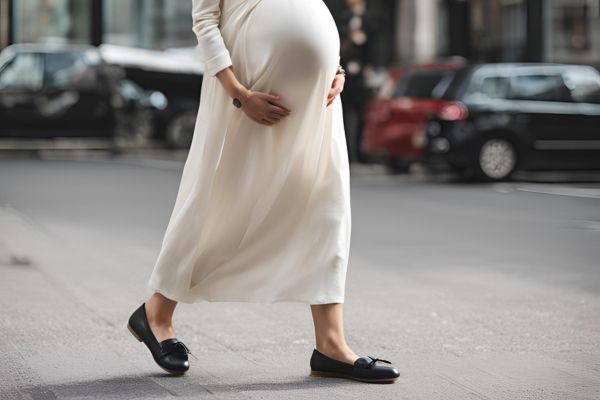Pregnancy is a whirlwind of changes, and your feet are no exception. Increased weight, hormonal shifts, and loose ligaments can all contribute to foot pain, swelling, and instability. As you navigate these changes, the question of footwear becomes crucial. While flat shoes for pregnancy may seem like the most comfortable option, the answer isn’t a simple yes or no. Let’s delve into the world of pregnancy footwear and explore the best options for keeping your feet happy and healthy.
The Appeal of Flats
There’s no denying the comfort factor of flat shoes. They offer a sense of stability on the ground, eliminating the wobble that can come with heels. Additionally, flats with a broader toe box can accommodate swelling, a common pregnancy woe.
Here are some specific types of flats that can be good choices:
- Sneakers: They provide excellent arch support, cushioning, and stability. To avoid slips, opt for well-fitting sneakers with good traction.
- Loafers: Stylish and comfortable loafers with supportive soles are excellent options for work or casual wear.
- Oxfords: Similar to loafers, oxfords offer a touch of formality while maintaining comfort. Choose a pair with good arch support and a wider fit.
The Downside of Completely Flat
While flats offer undeniable comfort, some lack essential features for proper foot health during pregnancy. Here’s why completely flat shoes might not be the best choice:
- Lack of Arch Support: Pregnancy loosens ligaments in your feet, leading to a flattening of the arches. This can cause pain and discomfort, and flat shoes without arch support can exacerbate this issue.
- Minimal Shock Absorption: Flat soles with minimal cushioning offer little shock absorption. It can put extra stress on your joints, especially your knees and back, as you carry additional weight.
Finding the Right Balance
So, what’s the ideal footwear for pregnancy? The key lies in finding a balance between comfort and support. Here’s what to look for in your pregnancy shoes:
- Arch Support: A well-defined arch support helps maintain the natural alignment of your feet and ankles, reducing pain and fatigue.
- Cushioning: The sole’s cushioning absorbs shock and protects joints from the impact of walking.
- Good Fit: Choose shoes that fit comfortably without pinching or rubbing. If your feet swell slightly, consider buying shoes half a size larger than usual.
- Material: Breathable materials like leather or canvas allow for proper ventilation and prevent sweaty feet.
Other Options
While flats can be a part of your pregnancy footwear wardrobe, other options offer additional support and comfort:
- Walking Shoes: These shoes are designed for long walks and typically offer excellent arch support, cushioning, and a stable platform.
- Pregnancy-Specific Shoes: Some companies design shoes specifically for pregnant women. These shoes often incorporate features like adjustable straps, extra arch support, and wider toe boxes to accommodate swelling.
Tips for Keeping Your Feet Happy
Here are some additional tips to keep your feet comfortable and healthy throughout your pregnancy:
- Elevate your feet: Whenever possible, elevate your feet above your heart to reduce swelling.
- Stretch: Regular foot stretches can help improve circulation and alleviate pain.
- Massage: A gentle foot massage can help reduce tension and improve blood flow.
- Support Stockings: Compression stockings can help reduce swelling and improve circulation, especially during long periods of sitting or standing.
Remember
Listen to your body! If a particular pair of shoes, even if they seem perfect on paper, causes discomfort, don’t hesitate to switch them out. Comfort is critical during pregnancy, and your feet will thank you for prioritizing their well-being. Don’t be afraid to experiment and find the best shoes for pregnancy that work satisfactorily for you. With a bit of research and these tips in mind, you can navigate pregnancy with happy and healthy feet.





